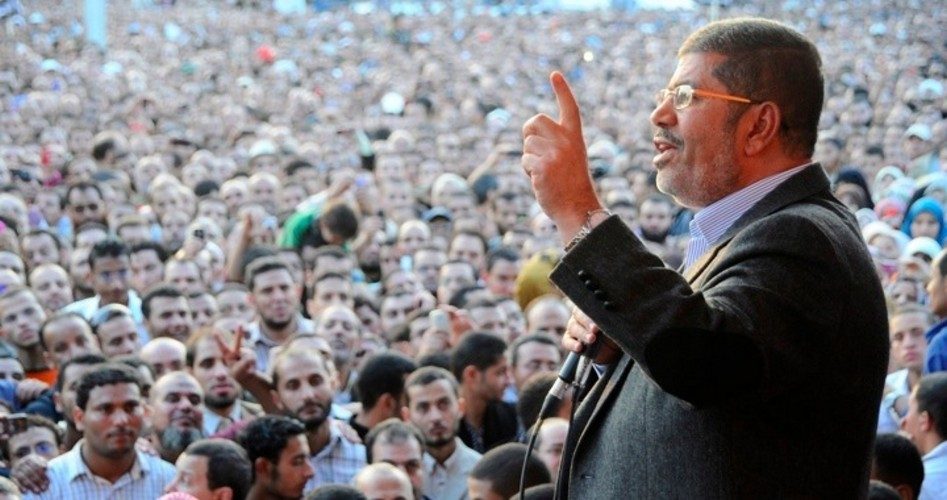
The Thanksgiving Day decrees by Egyptian President Mohammed Morsi sent Egypt back into street protests and turmoil, prompting dissident Mohamed ElBaradei to charge Morsi had become a “new pharaoh.” But is Egypt’s elected president seizing dictatorial powers, or is he instead protecting elected government from the onslaught of a runaway judiciary appointed by the former dictator Hosni Mubarak?
The establishment media in the United States and the West has decided the former, portraying the power struggle as one with Islamic extremists on one side, and everyone else on the other side. In that media campaign, the Western media has an ally among the secular parties. “Morsi usurped all state powers and appointed himself Egypt’s new pharaoh. A major blow to the revolution that could have dire consequences,” dissident and former Nobel Prize-winning former United Nations bureaucrat Mohamed ElBaradei told the press.
At issue is Morsi’s six-part decree.
First, Morsi nullified Egypt’s Supreme Judicial Council (the nation’s Supreme Court) rulings invalidating the parliamentary election results of January 2012, where Egyptians chose an Assembly (lower house of parliament) dominated by the Muslim Brotherhood’s Freedom and Justice Party and its Salafist allies. Both the Muslim Brotherhood’s and the al Noura Party Salafists identify with Islam and Sharia law.
Second, Morsi reopened criminal prosecutions of Mubarak-era murders of protesters and dissidents by government officials (closed by the Mubarak-dominated courts and prosecutor-general).
Third, Morsi appointed his own prosecutor-general (roughly equivalent to the U.S. Attorney General).
Fourth, Morsi invalidated any court rulings that would abolish elected bodies or the provisional constitution proclaimed by Mubarak before his ouster.
Fifth, Morsi ordered drawing up a new constitution by a select committee of the elected Assembly within six months.
The five decrees summarized above are understandable, considering the judicial overreach by Supreme Judicial Council members — all of them Mubarak holdovers. (The remaining decree will be discussed below.) The Egyptian Supreme Judicial Council dissolved the legitimately elected legislative Assembly (the lower house of Egypt’s parliament) in its own decree of November 7. “All the rulings and decisions of the Supreme Constitutional Court are final and not subject to appeal … and are binding for all state institutions,” the unelected court ruled November 7, reaffirming two earlier decisions abolishing the Assembly.
It’s more than a little hypocritical of the Supreme Judicial Council to claim — as it’s now doing — that Morsi is taking dictatorial power so soon after the council dissolved the Assembly, half of the only other elected branch of government. The decision — on the day of the U.S. presidential and congressional elections — was equivalent to the U.S. Supreme Court ruling that the U.S. election results were invalid, and that the U.S. House of Representatives should be abolished until new elections take place.
This was actually the third time the Egyptian Supreme Judicial Council declared the January elections invalid. The parliament had been elected in January 2012, but was dissolved by the military after the June Supreme Judicial Council decision claiming the elections were invalid. The November 7 decree followed similar rulings by the same court in July and September upholding the dissolution of the parliamentary Assembly. Morsi’s latest decree is the most recent battle between the secular, military-allied court and the popular, Islamist-leaning Assembly and president.
The final Morsi decree is the worrisome one:
“The President may take the necessary actions and measures to protect the country and the goals of the revolution.”
What this final decree means has not been clarified or sufficiently limited by Morsi, but the power taken by President Morsi is theoretically unlimited. Morsi’s decree was almost certainly an attempt to stop the Supreme Judicial Council from invalidating the election results in the upper house of parliament (the Shura Council), since the court was expected to take up a case to do just that in the coming months. The Shura Council had been elected in the same election as the Assembly. And there were even unconfirmed rumors in the Egyptian press that the court would consider declaring the presidential election invalid. (The 2012 presidential and parliamentary elections were the first fair elections in the nation’s history.)
Morsi’s decree comes in the wake of charges that his government has begun to engage in censorship. The British Broadcasting Corporation reported allegations of government censorship, including struggles with government-owned news, which is still in the grip of Mubarak-era secular holdovers.
Egypt is clearly in the throes of a struggle between a judiciary tied to the old dictatorial ways, and an Islamist president educated in the United States who claims to represent both pluralistic interests and Islam. The judicial branch has clearly overreached, and attempted to invalidate election results it didn’t like. The only question that remains for Egypt is: Will Morsi become the new Pharaoh for Egypt, or will he, like the Roman Consul Cincinnatus, walk away from dictatorial power and hand it all back to the legislative branch when the new constitution is drafted? That question has yet to be decided.
Photo of Mohammed Morsi: AP Images



